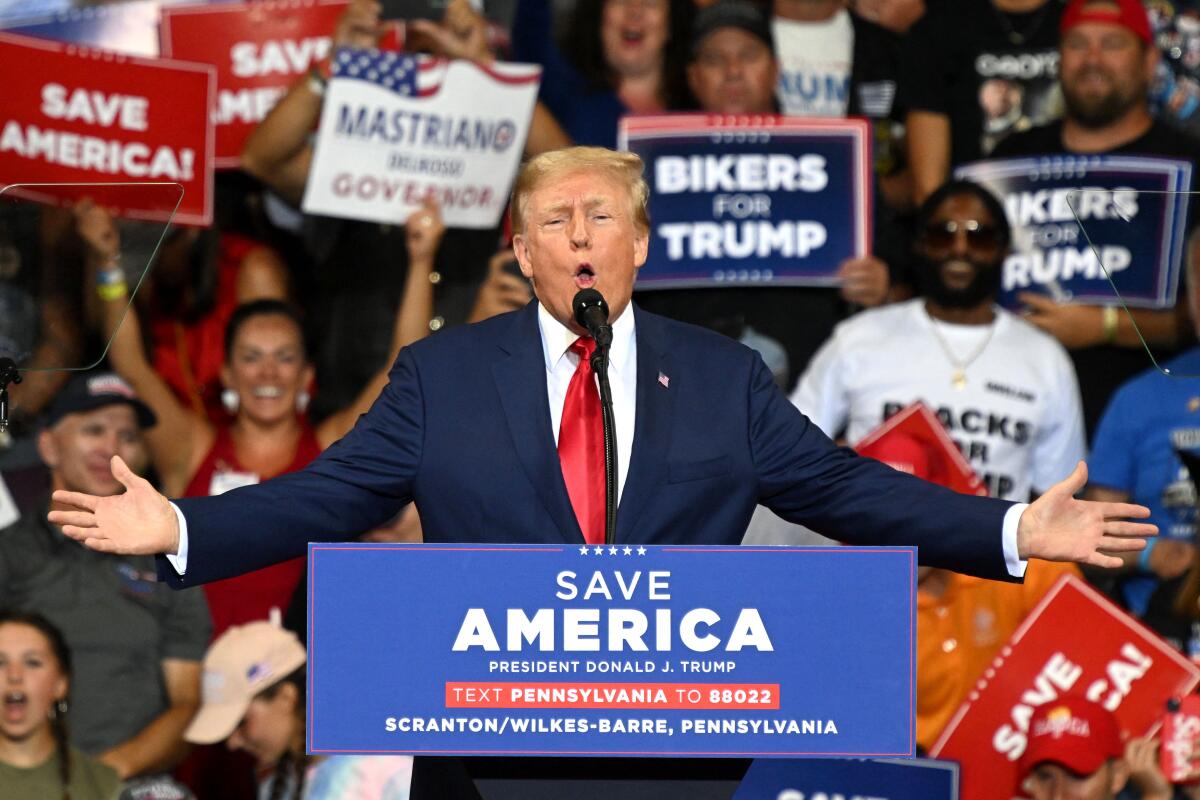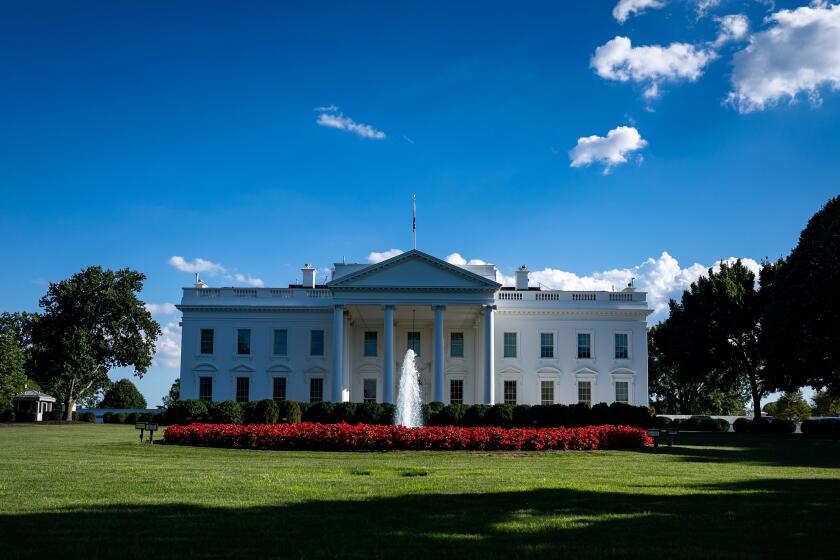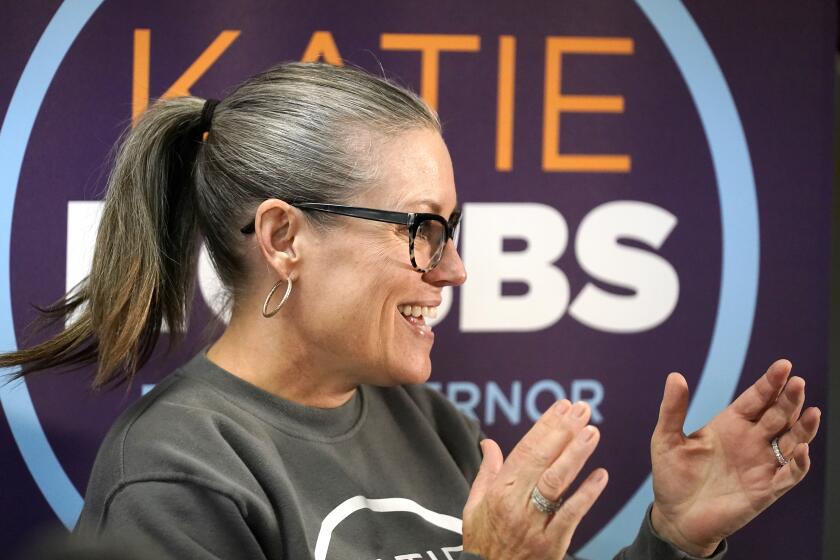Column: The GOP hopes to take control of Congress, but Trump is in the way

WASHINGTON — Two months ago, as Americans began their summer vacations, the political landscape looked bleak for Joe Biden and his Democrats.
Inflation was soaring; the president’s popularity was sinking. Political forecasters said a Republican takeover of the House of Representatives in November’s congressional election looked almost foreordained. A GOP takeover of the Senate appeared in reach, too, which would doom Biden to two years of partisan gridlock.
By last week, the climate had changed. Biden’s popularity, while still well below 50%, had struggled back toward respectability. Polls from the Wall Street Journal and CBS News suggested that the November election was tightening — not enough to give Democrats much confidence, but enough to throw a scare into Republicans.
In last week’s Wall Street Journal poll, Democrats held a slight advantage, 47% to 44%, when voters were asked which party they favored in the congressional vote — the first Democratic lead all year in the Journal’s surveys.
Trump’s insistence on staying in the spotlight has given President Biden something he badly needed — a unifying theme for his administration.
Pollsters point to several reasons for the shift. Gas prices have eased a bit. Congress rescued Biden’s legislative agenda by passing a sweeping climate and healthcare bill. And the Supreme Court’s June decision to reverse the 1973 Roe vs. Wade ruling guaranteeing the right to abortion galvanized moderate women and younger voters.
Now add an unusual wild card — the raging reappearance of former President Trump, the most polarizing figure in American politics.
Since his loss to Biden in the 2020 presidential election, Trump has never gone away, of course. Unlike other former presidents, he has not only refused to acknowledge his election loss, he has demanded continued obeisance from his party and plotted a potential comeback.
As the 2022 congressional campaign has heated up, Trump has roared back into the arena, endorsing GOP candidates who back his baseless claims of election fraud and punishing those who don’t.
Even if he weren’t campaigning, Trump would be in the news thanks to the FBI’s search of his Florida home, Mar-a-Lago, for classified documents that he retained, apparently illegally, when he left the White House.
But Trump has tried to turn his legal problems into a rallying point for his followers.
On Saturday, at a GOP campaign rally in Pennsylvania, he condemned FBI agents as “vicious monsters” who were following Democrats’ orders “to keep me from returning to the White House.”
The Mar-a-Lago search last month roused Trump and his supporters to fury.
The former president denounced it as “an assault on democracy.” Rep. Marjorie Taylor Greene of Georgia, one of his most ardent cheerleaders, said it was time to “defund the FBI.” Sen. Lindsey Graham of South Carolina, another Trump acolyte, warned that prosecution of the former president would provoke “riots in the streets.”
Not surprisingly, the ensuing legal battles have dominated news coverage for weeks — and have gotten squarely in the way of the campaign message Republican leaders were hoping to promote.
“If everything [in the news] is Mar-a-Lago every night, it’s hard to keep the economy at the top of people’s minds,” GOP pollster and strategist David Winston told me last week.
The key to GOP prospects in November isn’t mobilizing Trump loyalists to vote, he said; they’re already energized. It’s wooing independents and moderate Republicans.
“This election is going to be about independents,” Winston said, adding that when those voters see Trump on their television screens, “their reaction is: ‘This guy again?’”
When the debate is about Biden and the economy, that’s good for Republicans. When the debate is about Trump, that’s good for Democrats.
Trump doesn’t seem to understand that, but Biden and the Democrats do.
A midterm election is often a referendum on the sitting president — in this case, Biden.
Democrats hope, instead, to make the election a choice between Biden and Trump — a rerun of the 2020 contest that Biden won handily.
Biden’s passionate speech in Philadelphia last week, in which he denounced Trump and “MAGA Republicans” as extremists who pose “a threat to this country,” drew directly from the original animating theme of the president’s 2020 campaign.
“I ran for president because I believed we were in a battle for the soul of this nation,” he said. “I still believe that to be true.”
Biden clearly believes those sentiments — but they are also politically useful for Democrats.
To borrow another Bidenism, he’s saying: Don’t compare his party to the Almighty; compare it to the alternative.
No wonder Republicans want to change the subject.
According to most forecasts, the GOP still stands a better-than-even chance of taking control of the House, where a net gain of only five seats would enable them to oust Nancy Pelosi as speaker.
But thanks partly to Trump, Republicans face an uphill struggle in the 50-50 Senate, even though they need only one more seat to take over.
In four states where the GOP believed its chances were strong, Trump-backed candidates are struggling: Pennsylvania (Dr. Mehmet Oz), Georgia (Herschel Walker), Ohio (J.D. Vance) and Arizona (Blake Masters).
Trump arguably helped Democrats win control of the Senate in January 2021 when he intervened chaotically in Georgia’s runoff election, telling Republicans that the voting process was corrupt and their votes would be wasted. He may be on the verge of repeating that dubious feat.
If so, Senate Democratic leader Charles E. Schumer of New York will owe him thanks.
And Republicans will be left to consider a deeper lesson: Maybe relying on an angry, radicalized base isn’t just bad for the country; it’s bad electoral strategy, too.
More to Read
Get the L.A. Times Politics newsletter
Deeply reported insights into legislation, politics and policy from Sacramento, Washington and beyond. In your inbox three times per week.
You may occasionally receive promotional content from the Los Angeles Times.












